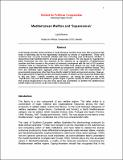Por favor, use este identificador para citar o enlazar a este item:
http://hdl.handle.net/10261/1496COMPARTIR / EXPORTAR:
 SHARE
BASE SHARE
BASE
|
|
| Visualizar otros formatos: MARC | Dublin Core | RDF | ORE | MODS | METS | DIDL | DATACITE | |

| Campo DC | Valor | Lengua/Idioma |
|---|---|---|
| dc.contributor.author | Moreno, Luis | - |
| dc.date.accessioned | 2007-10-16T12:19:41Z | - |
| dc.date.available | 2007-10-16T12:19:41Z | - |
| dc.date.issued | 2002-01 | - |
| dc.identifier.citation | Mediterranean Welfare and ‘Superwomen, Serie Documentos de Trabajo, Instituto de Políticas y Bienes Públicos (CSIC), 02-2002 | - |
| dc.identifier.uri | http://hdl.handle.net/10261/1496 | - |
| dc.description.abstract | In the last two decades, family members in South European countries have been able to preserve high levels of well-being due to the hyperactivity developed by cohorts of ‘superwomen’. These have combined their non-paid household activities with their increasing paid professional activities, a phenomenon that manifests itself in all social groups and classes. The role played by ‘superwomen’ within households has been very important for the ‘catching up’ up aspirations of Mediterranean countries and their success in the process of economic convergence with the rest of EU countries. Sacrifices made by ‘superwomen’ in the 1980s and 1990s have allowed not only South European countries to cope better with welfare retrenchment as compared to Central and Northern Europe. They have also facilitated higher aggregate public and social expenditure with the implementation of governmental programmes other than those directly related to family and personal services. However, the postponement of maternity and the decreasing number of children are the causes that fertility rates in Italy and Spain --Catholic countries par excellence-- are among the lowest in the world. ‘Superwomen’ may have well allowed a greater degree of gender equality for future generations, but their gradual disappearance may also bring about new uncertainties on whether the Mediterranean welfare regime can survive, as we have known it until present. | en |
| dc.language.iso | eng | en |
| dc.publisher | Consejo Superior de Investigaciones Científicas (España) | - |
| dc.relation.ispartofseries | Documento de Trabajo IPP, 02-2002 | en |
| dc.rights | openAccess | en_US |
| dc.subject | Mujeres | es |
| dc.subject | Conciliación de la vida familiar y laboral | es |
| dc.subject | Estado del bienestar | es |
| dc.subject | Países mediterráneos | es |
| dc.title | Mediterranean Welfare and ‘Superwomen’ | en |
| dc.type | documento de trabajo | en |
| dc.relation.publisherversion | http://ipp.csic.es/es/workpaper/mediterranean-welfare-superwomen | - |
| dc.contributor.orcid | Moreno, Luis [0000-0003-0739-165X] | - |
| dc.type.coar | http://purl.org/coar/resource_type/c_8042 | es_ES |
| item.grantfulltext | open | - |
| item.openairetype | documento de trabajo | - |
| item.cerifentitytype | Publications | - |
| item.languageiso639-1 | en | - |
| item.fulltext | With Fulltext | - |
| item.openairecristype | http://purl.org/coar/resource_type/c_18cf | - |
| Aparece en las colecciones: | (CCHS-IPP) Informes y documentos de trabajo | |
Ficheros en este ítem:
| Fichero | Descripción | Tamaño | Formato | |
|---|---|---|---|---|
| mediterranean_welfare_superwomen.pdf | 152,55 kB | Adobe PDF |  Visualizar/Abrir |
CORE Recommender
Page view(s)
866
checked on 12-may-2024
Download(s)
487
checked on 12-may-2024
Google ScholarTM
Check
NOTA: Los ítems de Digital.CSIC están protegidos por copyright, con todos los derechos reservados, a menos que se indique lo contrario.
